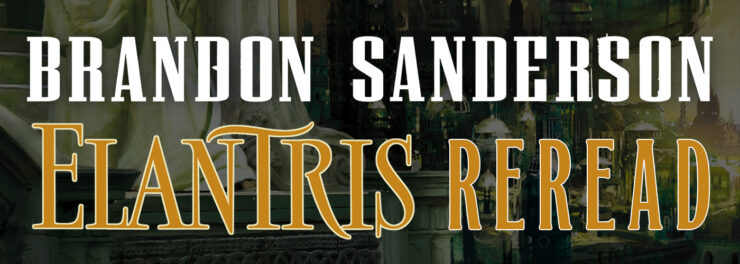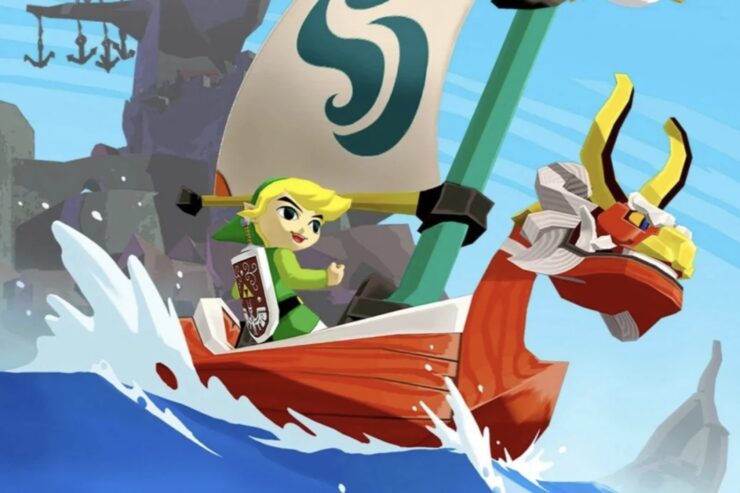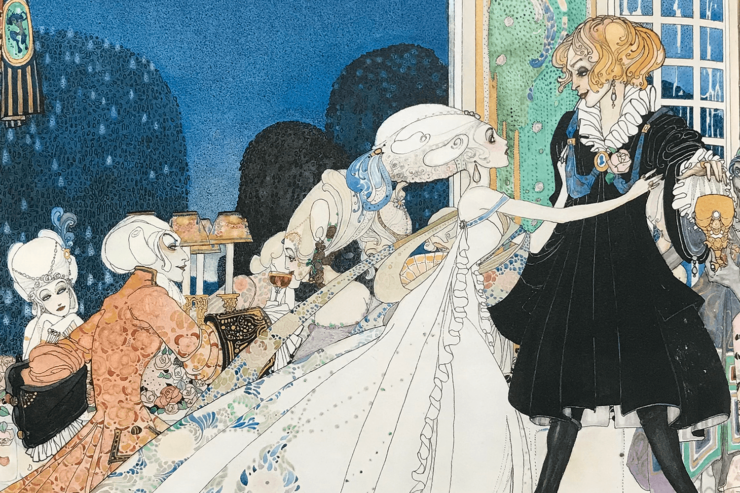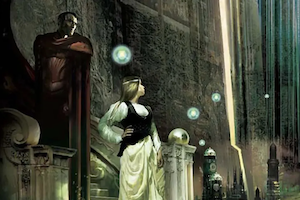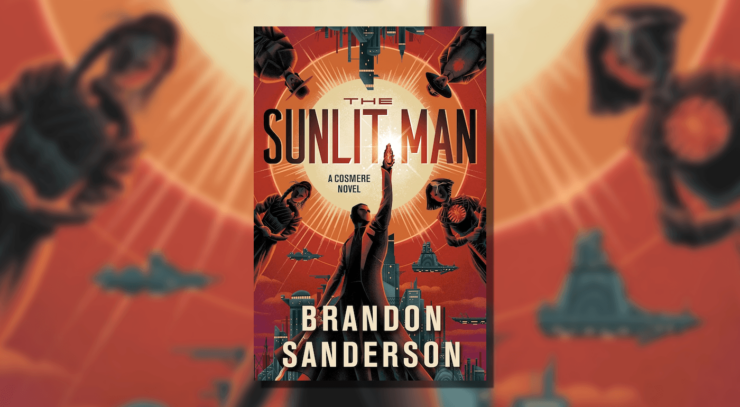Good day, Cosmere Chickens, and welcome to another exciting installment of the Elantris Reread!
Well… maybe not that exciting. Admittedly, not a lot happens in these chapters—but we do learn a lot about Hrathen and Sarene and meet some absolutely delightful family members of Sarene’s…
Spoiler warning: This week’s article has no spoilers from other Cosmere works. Read on fearlessly, chickens!
Trigger Warnings: Some discussion of religious missions and indoctrination.
Last time on Elantris…
After meeting Hrathen, we learn about his goal… to convert the entirety of the city of Kae in order to prevent his country from sweeping in and conquering it by force. He takes over the local church and kicks out the previous leader, then takes the zealot Dilaf under his armored wing.
Meanwhile, Raoden learns about what life is like inside Elantris. Namely… awful. There are three main gang leaders who control the city between them, people have been reduced to eating books in their desperation, and—most interesting of all—the magic of the Elantrians still exists.
Chapter Essentials
POV Character(s): Serene and Hrathen
Chapter Five
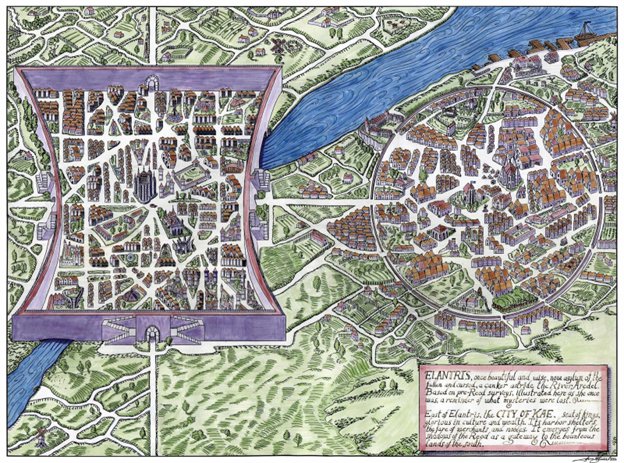
“MERCIFUL Domi,” Sarene breathed, “where did he come from?”
The gyorn strode into the king’s throne room with the arrogance characteristic of his kind.
P: And so Sarene is made aware that Hrathen is in town, and learns that he’s trying to convert the king to Shu-Dereth.
“That is a full gyorn, Ashe. There are only twenty of them in the entire Fjordell Empire.”
L: I like this little tidbit that there are only 20 of them. Puts his status in perspective.
Buy the Book
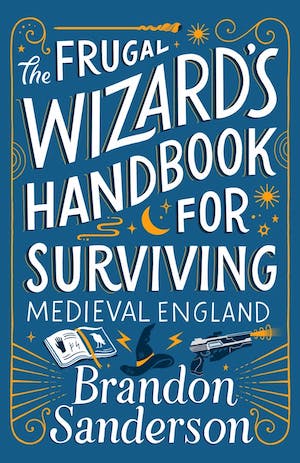

The Frugal Wizard’s Handbook for Surviving Medieval England
P: It definitely shows us that they’re very elite members of the church.
“I already believe in Shu-Korath, priest. We serve the same God.”
“Shu-Dereth is the only true form of Shu-Keseg,” Hrathen said darkly.
Iadon waved a dismissive hand. “I care nothing for the squabbles between the two sects, priest.”
L: Very interesting worldbuilding here for the world’s religions. I wonder if they have anything at all to do with greater Cosmere theory and Shardbearers, or if they rose up completely independently.
P: It is interesting. Especially that they serve the same God. It makes me think of how Judaism, Christianity, and Islam all follow the same God but each believe that their religion is the true one.
“Oh, Ashe,” she said sweetly. “Why would I bother with a bunch of incompetent would-be nobles when I can match wits with a gyorn?”
L: I do love Sarene’s ambition and mischievous nature.
P: I was drawn to her immediately on my first read of this book. I love her snark.
“I’m sorry, my memory isn’t what it used to be.”
L: Well that’s interesting. A Seon’s memory declining? I wonder if it has something to do with the earthquake…? I never thought of Seons as being “normal” creatures with lifespans, susceptible to the ravages of aging.
P: The Coppermind says they’re immortal, so perhaps it’s some kind of deterioration since the quake.
“Come, you have to meet my wife.”
“Wife?” Sarene said, shocked. It had been over a decade since she had seen Kiin, but she remembered one fact quite clearly. Her uncle had been a sworn bachelor and a confirmed rascal. “Hunkey Kay is married?”
“You aren’t the only one who has grown over the last ten years,” Kiin rasped. “Oh, and as cute as it is to hear you call me ‘Hunkey Kay’ like you did as a child, you’ll probably want to call me Uncle Kiin now.”
P: And so Sarene has family in Kae, which is nice. The poor girl won’t face all of her time alone with no company but Ashe.
L: And they’re an absolute delight to boot!
Adien was a thin-faced boy in his late teens. He had a pale white complexion and a strange, discomforting cast to his face. He ate awkwardly, his motions stiff and uncontrolled. As he ate, he mumbled to himself—repeating numbers, as far as Sarene could tell. Sarene had met people like him before, children whose minds weren’t completely whole.
L: Our first hint at Adien’s true nature as a broken Elantrian.
P: I had completely forgotten about that!
“It was the servants who started the revolution, Sarene. The very day their masters fell, the servants turned on them. Some—mostly the country’s current nobility—say it was because the lower class in Elantris was treated too well, that their pampered natures inspired them to cast down their former rulers at the first sign of weakness. I think it was simply fear—ignorant fear that the Elantrians had a vile disease, mixed with the terror that comes from seeing someone you had worshipped stricken down before you.
“Either way, the servants are the ones who did the most damage.”
L: Oooh, very interesting. I’m getting “French Revolution” vibes, which tracks for Sanderson, as he’s a big fan of Les Misérables.
P: This definitely has that vibe.
“Elantrians. Daora and I watched it all, horrified and thankful that there were no Elantrians in the family.”
L: It’s a good thing Adien was taken by the Shaod after the Reod…
P: Truth. If he hadn’t been killed, he’d have been trapped in Elantris.
“This is Ashe,” Sarene said. “He’s been serving my house for over two centuries,
L: So, seons clearly have longer-than-average lifespans, at least.
P: I checked the Coppermind and it does list immortality among their abilities.
Chapter Six
“Nothing can hinder Jaddeth’s empire.”
“If nothing could hinder it, Arteth, then it would already encompass the entire planet.”
L: I’m really glad that Sanderson chose to include Dilaf, because he works so well as a foil to make Hrathen seem better by comparison. Personal opinion: I’m still not a fan of his attitude and approach to conversion, but at least Hrathen has some good intentions behind his actions.
P: He’s much less detestable than Dilaf, for sure.
Beautiful, terraced steps ran up the exterior of Elantris’s wall, providing outside access to the top.
L: It does seem a bit foolhardy to have steps on the outside of your city walls… But hey, when all your inhabitants have the powers of gods, who’s gonna worry about an invading force?
P: Doesn’t make a lot of sense, does it? I thought they’d perhaps been added after the Reod, but why build beautiful stairs on a cursed city?
L: I imagine that, before the Reod, regular people liked to go up and just look into the city.
“The first step in taking control of a nation, Arteth, is the simplest. You find someone to hate.”
L: Hooboy. This is one of those quotes that has so much truth to it that you look at it and just… shudder. So many tyrants and dictators have chosen this very path, the most infamous of which, of course, was Hitler. Give people a scapegoat and some (though not all) will rally together against them.
P: It’s so true that giving people someone to hate and fear can bring them together. And very sad.
“Right now all they see are the abject remnants of what were once aristocrats—men do not loathe such, they pity them. Demons, however, are something everyone can hate.”
L: You know… I look at passages like this, and the one quoted above and below, and think back to all those college professors I had who said that there was nothing worthwhile in genre fiction. How fantasy and sci-fi books couldn’t tell us anything real about the human condition. And I just roll my eyes at how close-minded and blind they were.
P: I wonder what they’d think of Brandon’s work?
“You assume because Jaddeth did not give them powers, they did not have any.”
Dilaf’s face grew pale. “What you say is—”
“Not blasphemy, Arteth. Doctrine. There is another supernatural force besides our God.”
“The Svrakiss,” Dilaf said quietly.
“Yes.” Svrakiss. The souls of the dead men who hated Jaddeth, the opponents to all that was holy. According to Shu-Dereth, there was nothing more bitter than a soul who had had its chance and thrown it away.
“You think the Elantrians are Svrakiss?” Dilaf asked.
“It is accepted doctrine that the Svrakiss can control the bodies of the evil,” Hrathen said, unbuckling his greaves. “Is it so hard to believe that all this time they have been controlling bodies of the Elantrians, making them appear as gods to fool the simpleminded and unspiritual?”
P: So the plan is to make the people of Arelon think that the Elantrians are demons, thus uniting them with the Fjordell and converting them to defeat the Elantrians. That’s what I’m getting from this.
“You will find that hate can unify people more quickly and more fervently than devotion ever could.”
L: I really wish this weren’t as true as it is. Or rather… I wish that people didn’t use it to gain control over others as often as they do.
P: And we see it in our own world far too much.
We’ll be leaving further speculation and discussion to you in the comments, and hope to join you there! Next week, we’ll be back with chapters seven and eight.
Paige resides in New Mexico, of course. She has been to numerous baseball games so far this season and is looking forward to a family trip to see the Yankees in Colorado next weekend. Links to her other writing are available in her profile.
Lyndsey lives in Connecticut and makes magic wands for a living, as well as working as the costumer for two of her local Renaissance Faires. If you enjoy queer protagonists, snarky humor, and don’t mind some salty language, check out book 1 of her fantasy series. Follow her on Facebook or TikTok!










